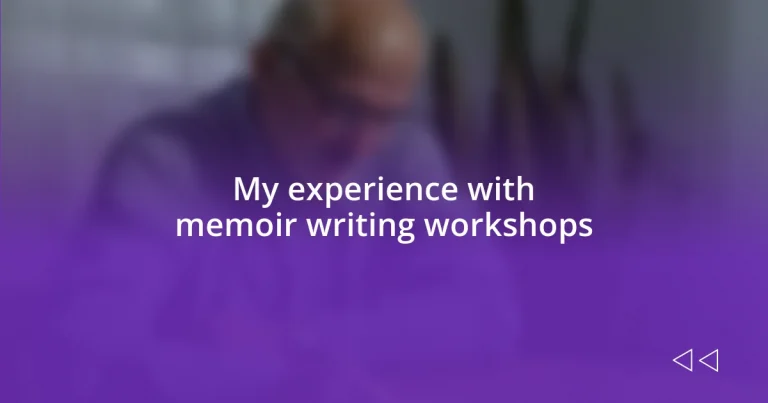Key takeaways:
- Memoir writing workshops provide a supportive environment for writers to explore personal stories, unlocking emotions and fostering community through shared experiences and feedback.
- Techniques learned, such as using prompts and focusing on sensory details, enhance storytelling by encouraging deeper reflection and authenticity in writing.
- Creating a flexible memoir outline allows writers to organize their thoughts and experiences, facilitating personal growth and insight through the writing process.
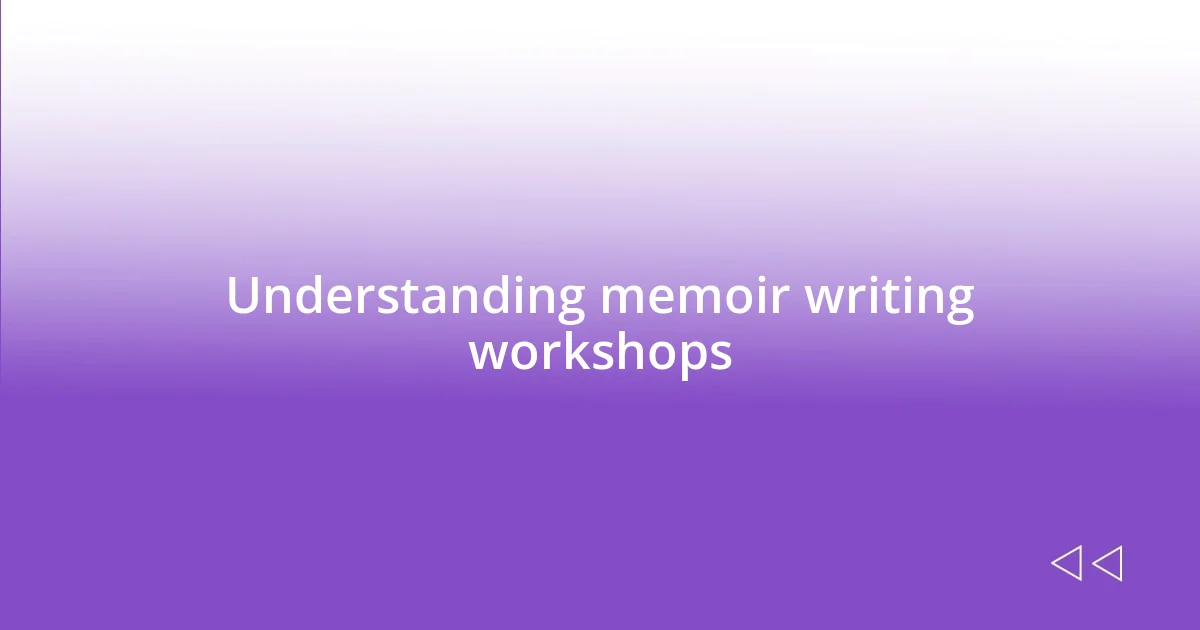
Understanding memoir writing workshops
Memoir writing workshops are spaces where personal stories take center stage, allowing writers to explore their lives through the lens of reflection. I remember attending my first workshop, feeling both excited and vulnerable as I shared a particularly painful memory. It raised an interesting question for me: how can revisiting our past help us understand not only ourselves but also the world around us?
In these workshops, it’s common for participants to engage in guided exercises designed to unlock memories and refine storytelling techniques. I found that these exercises often pushed me outside my comfort zone, evoking deep emotions that I hadn’t fully acknowledged before. This process can be both liberating and daunting—what if you unearth something you’re not ready to confront? Yet, the supportive environment often encourages participants to embrace those challenges, creating a powerful sense of community.
Moreover, feedback from fellow writers plays a crucial role in shaping our narratives. I recall a moment when a peer pointed out a subtle detail in my story that I hadn’t even considered, illuminating a totally new perspective. Isn’t it fascinating how the act of sharing our truths can lead to shared insights? Each workshop is a unique journey, offering not just skills, but also a deeper understanding of the intricacies of our personal narratives.
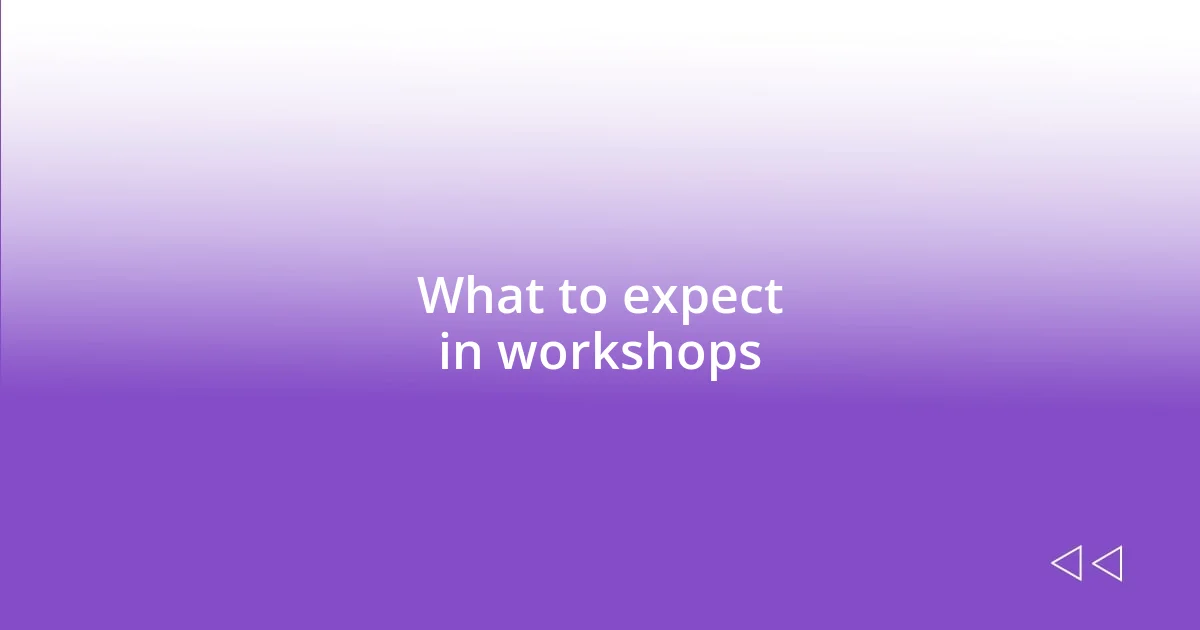
What to expect in workshops
In memoir writing workshops, participants can expect a blend of structured exercises and organic discussions that fuel creativity and reflection. I’ll never forget a moment when we were prompted to write about our first significant loss. The raw emotions that emerged from my peers’ stories created an atmosphere of empathy that was both intense and healing. It’s these shared experiences that often foster deep connections among the writers.
Another critical aspect is the constructive feedback process. I vividly recall submitting a draft of a personal story about my childhood, and when feedback rolled in, it felt like I was peeking into a window through which others could view my life. It’s eye-opening to see how your words resonate differently based on someone else’s perspective. This process not only enriches your writing but also reinforces the universal themes that thread through our individual experiences.
Finally, workshops often cultivate a routine of accountability, which can be a game changer for a writer. Setting deadlines and sharing our progress motivates us to keep writing, even when self-doubt creeps in. I can think back to a time when I struggled to find the right words, and knowing I had to share my work at the next session spurred me on. This sense of obligation to the group can be incredibly empowering, pushing us to delve deeper into our narratives.
| Workshop Element | Experience |
|---|---|
| Structured Exercises | Stimulate creativity and reflection, often making participants revisit emotional moments. |
| Feedback Process | Offers new perspectives from peers, enhancing understanding of one’s narrative and its impact. |
| Accountability | Encourages regular writing practice and commitment to sharing work, boosting motivation and discipline. |
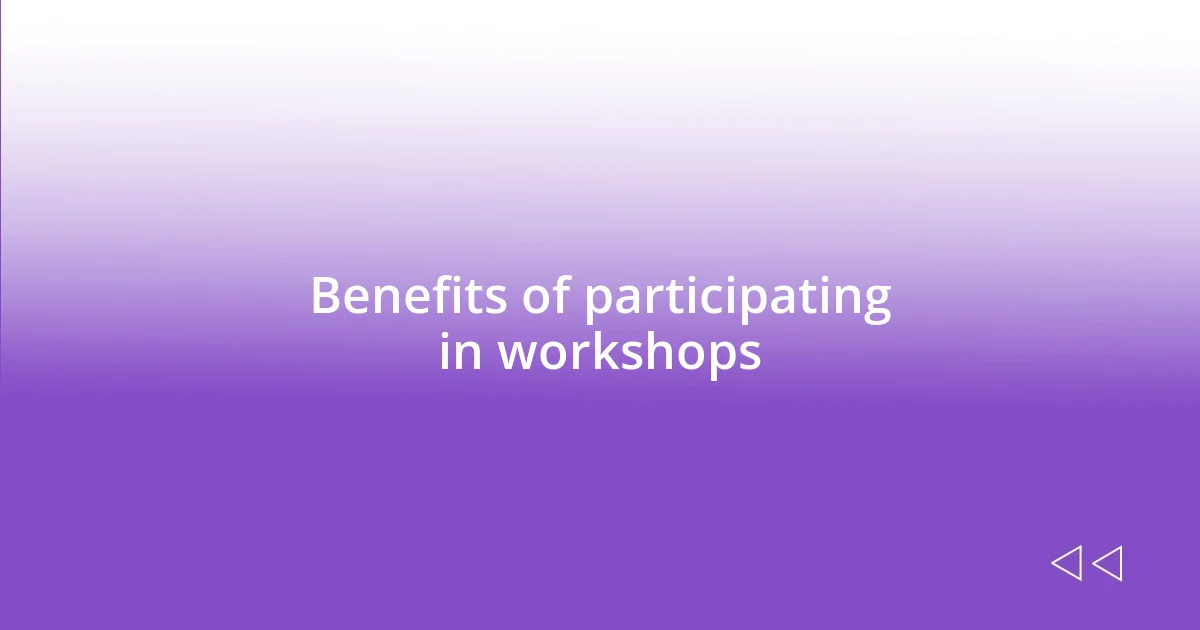
Benefits of participating in workshops
Participating in memoir writing workshops offers a multitude of benefits that extend far beyond simply honing your writing skills. One unforgettable moment for me was when a fellow participant shared her own struggle with grief. It reminded me how powerful and therapeutic storytelling can be. The collective vulnerability in the room transformed our individual experiences into something deeply relatable, creating a bond that energized our writing. I realized that every story matters and that our voices are amplified in a supportive environment.
- Community Support: Engaging with a diverse group fosters a sense of belonging, reducing feelings of isolation that often accompany personal storytelling.
- Emotional Growth: Revisiting past experiences brings forth buried emotions, promoting healing through expression and reflection.
- Enhanced Writing Skills: The feedback received is tailored and often eye-opening, helping refine your narrative voice and technique.
One specific aspect I greatly appreciate is the consistent practice that workshops encourage. A pivotal moment for me was when I committed to a weekly writing challenge proposed during one session. It ignited my creativity in a way I hadn’t experienced in years. Because I had peers eagerly awaiting my updates, I found myself pushing through writer’s block and tapping into stories I wouldn’t have otherwise explored. I came to realize how accountability not only propels us forward; it also nurtures our artistic growth.
- Regular Practice: The structured format ensures that you prioritize your writing amidst daily distractions, sharpening your discipline.
- Insightful Connections: Listening to others’ narratives deepens your empathy and invites you to consider broader themes that resonate across different lives.
- Confidence Building: Sharing your work, no matter how vulnerable, cultivates a sense of confidence and empowers you to embrace your unique voice.
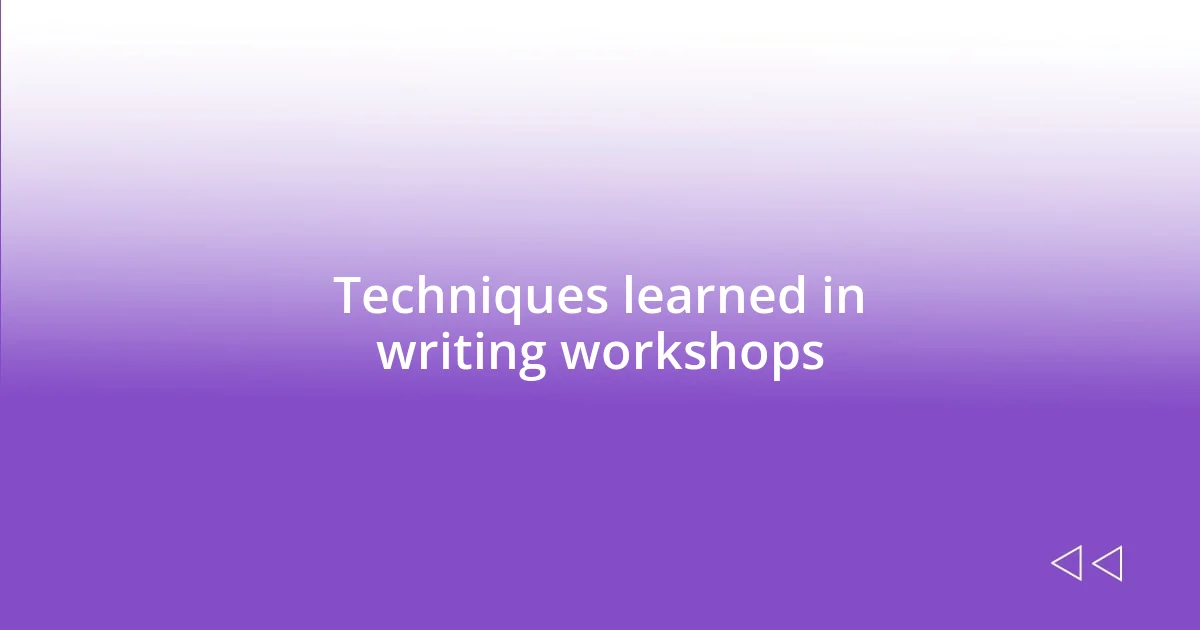
Techniques learned in writing workshops
One technique that stood out for me during the workshops was the use of prompts to ignite creativity. I remember a session where we were asked to write about a seemingly mundane object that held great meaning in our lives. As I described my grandmother’s old locket, I found myself not just recounting a memory but also uncovering layers of emotion I hadn’t consciously addressed. Isn’t it fascinating how something so small can open the floodgates of recollection and reflection?
Another impactful lesson was the focus on sensory detail. During one writing exercise, we were encouraged to describe a scene not only with visuals but also by connecting to sounds, smells, and even textures. This approach made my writing feel more immersive and alive. I recall vividly writing about the smell of fresh earth after a rainstorm, which transported my readers—and me—back to my childhood backyard. By anchoring readers in sensory experiences, our stories become more relatable and engaging.
Lastly, workshops emphasized the importance of voice—finding that unique rhythm and tone that reflects who we are as storytellers. I was hesitant at first, thinking my voice was too simple or ordinary. However, in one session, a mentor reminded me that authenticity resonates with readers more than any fancy language could ever hope to. I started to embrace my conversational tone, and the more I shared, the more I realized that my journey—my struggles and triumphs—were worth telling in my own way. What about you? Have you ever felt that difference between writing for yourself and writing to impress? Embracing my authentic voice transformed my memoir writing experience completely.
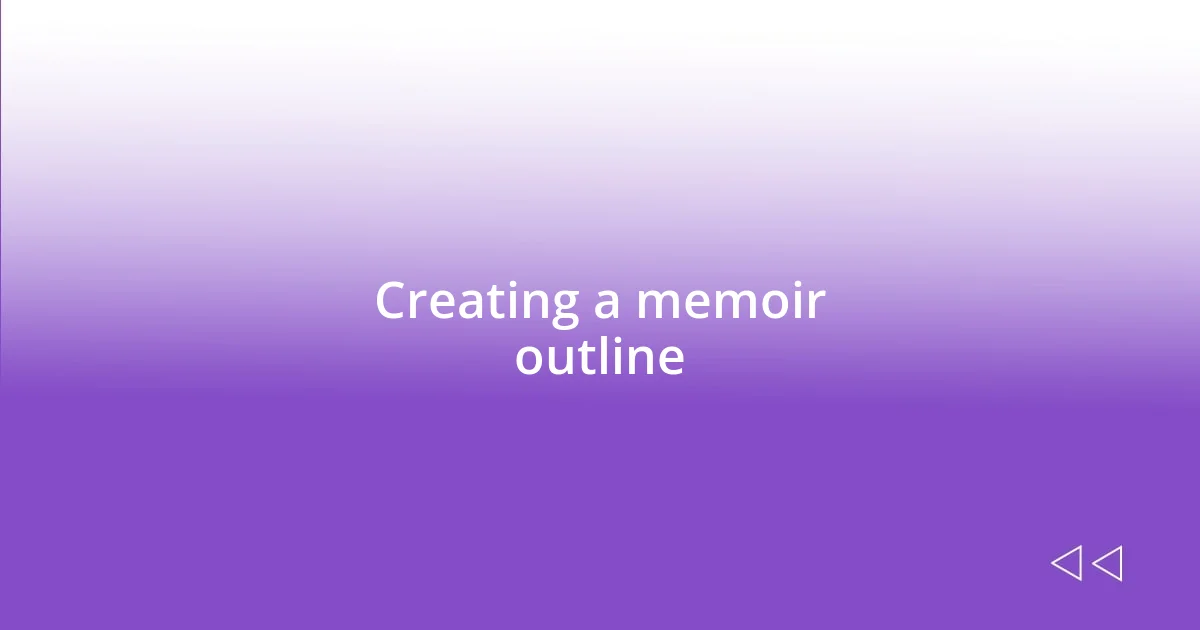
Creating a memoir outline
Creating a memoir outline is a crucial step that helps clarify your thoughts and organizes your memories. I remember feeling a mix of excitement and anxiety when I first tackled this task. I sat down with a cup of tea, putting everything I could think of on sticky notes and spreading them out on my dining table. The act of visualizing my life events helped me see connections I hadn’t noticed before, reminding me that sometimes, our experiences are threads in a larger tapestry.
As I began mapping out key themes, I found it essential to create a balance between significant life events and smaller, everyday moments. For instance, while a major life change like moving cities is pivotal, it was the quiet, reflective evenings alone in my new space that shaped my emotional landscape. I started asking myself, “Which moments resonate more deeply?” This line of questioning allowed me to prioritize anecdotes that would evoke emotions in readers, making my memoir feel not just like a collection of events, but rather a journey that others could connect with on a personal level.
I discovered that creating an outline isn’t a rigid process; it’s more like a flexible framework. In one workshop, my mentor encouraged us to treat our outlines as fluid guides instead of strict blueprints. I took this advice to heart and allowed my outline to evolve as I wrote. It opened doors to new insights, leading me to unexpected topics worth exploring, such as the unspoken lessons I learned from my grandmother’s stories. So, how do you view an outline? Is it a foundation or a constraint for your creativity? For me, it became a canvas where my narratives could blend and flourish, shaping a memoir that felt genuinely reflective of my journey.
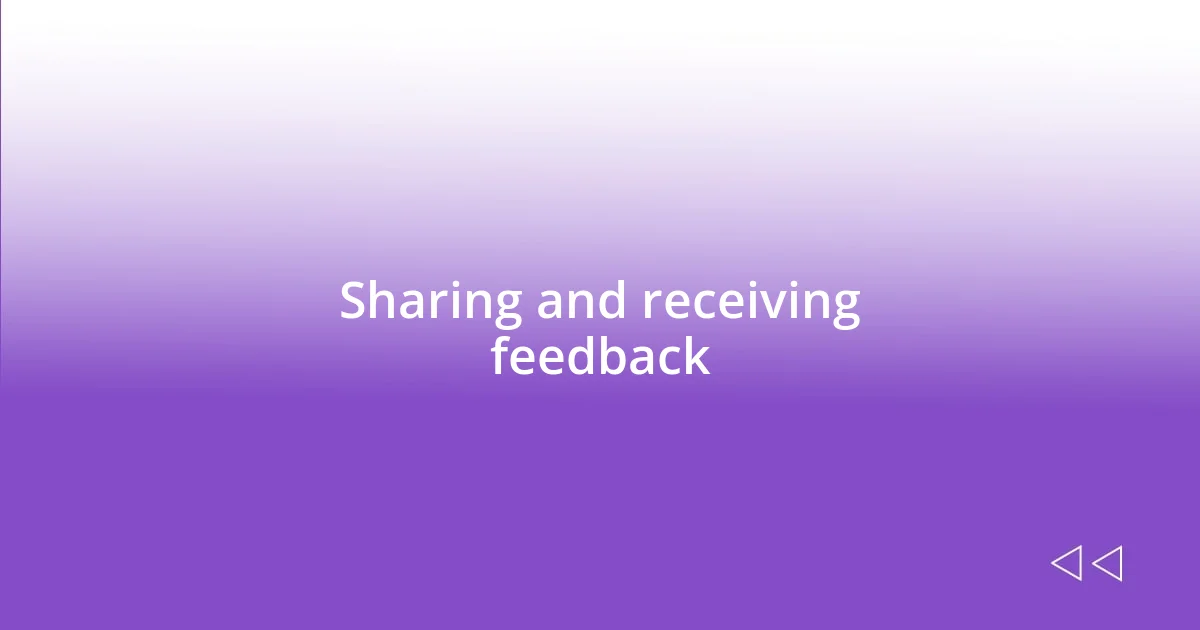
Sharing and receiving feedback
Participating in workshops, I quickly learned that sharing my work was an emotional rollercoaster. Each time I shared a piece, I felt a mix of vulnerability and exhilaration. I remember the first workshop where I read my passage aloud; my hands were shaking, and I feared judgment. But to my surprise, the feedback was constructive and heartfelt, revealing how my words resonated with others. Isn’t it amazing how age-old stories can bridge gaps between experiences?
Receiving feedback can be daunting, but it’s a vital part of growth. One workshop participant candidly noted how a particular sentence of mine reminded her of a similar event in her life, sparking a deep conversation about shared experiences. This moment highlighted not just the power of storytelling but how our lives intertwine in unexpected ways. When I reflect on it, I realize that constructive criticism not only helps refine my writing but also deepens my understanding of the emotions I wish to convey.
Yet, the real beauty lies in how feedback can inspire a writer’s journey. I often found myself re-evaluating my drafts based on the input I received. One mentor suggested I expand on a fleeting childhood memory, nudging me to delve deeper into my emotions connected to that moment. This exploration led to an ah-ha moment for me: sometimes, the richest narratives are hidden in the smallest details. Have you had a moment where feedback illuminated a path you hadn’t considered before? Those insights often become the heart of our memoirs, transforming not just our writing but also our perspectives.












